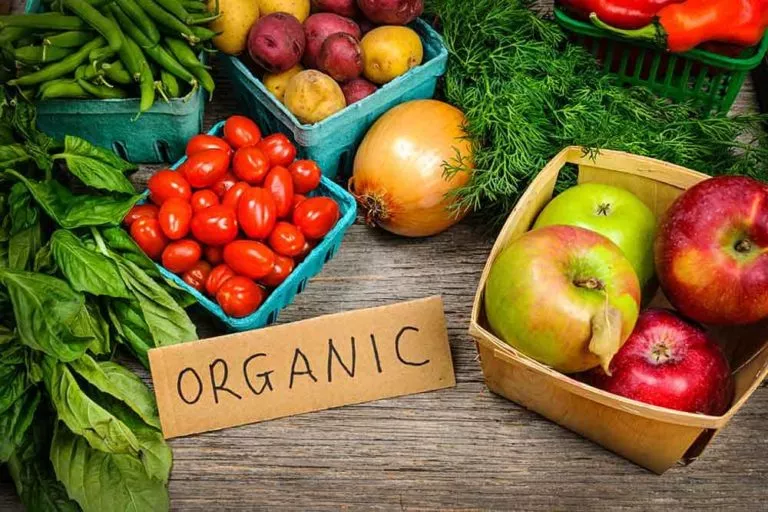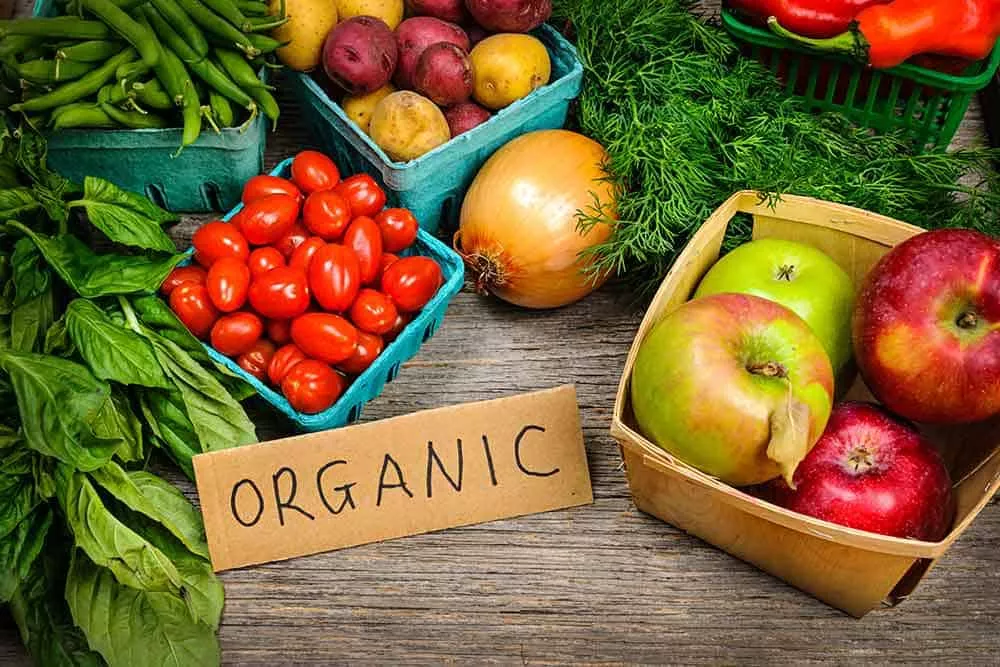Most growers know the importance of nutrients, but fewer have compared organic vs synthetic nutrients. While both of these nutrient types provide plants with vital compounds, they differ in a number of ways.
If you’ve ever asked yourself which of the two options is better, get ready. Because that’s exactly the question that we’re going to try and answer.

Organic vs Synthetic Nutrients/Synthetic vs Natural Nutrients
When choosing a source of fertility, you’ll see two main sources of plant nutrients: organic and synthetic. Both types of products provide plants with essential elements such as nitrogen. However, the products differ in a number of ways.
Synthetic Nutrients
Synthetic, aka conventional, nutrients are chemically-based and produced in a lab. Humans create these nutrients by making compounds containing elements such as potassium.
For example, humans produce synthetic nitrogen fertilizer via the Haber Bosch process. In this process, machines pull nitrogen gas from the air and convert it into ammonia fertilizer. This process relies on energy – mostly in the form of natural gas.
These fertilizers often have high concentrations of a few elements, rather than low concentrations of many elements. However, producers often blend multiple fertilizers together to form a product that contains multiple nutrients.
Organic Nutrients
Organic nutrients are made from naturally-occurring substances such as compost, manure, bat guano, bone meal, fish meal, and gypsum. They’re sometimes called natural nutrients. Producers harvest these additives from the natural world.
For example, organic nitrogen fertilizer comes substances such as manure and compost.
Since organic nutrients are from natural sources, they often contain small amounts of trace elements such as boron and zinc. Because these fertilizers contain small amounts of many elements, it can take a while to learn how to select the right balance of organic nutrients.
They Have Different Absorption Rates
One of the biggest differences between these two types of nutrients is the speed at which plants take up the compounds.
Plants quickly absorb most conventional nutrients out of the soil. Good, right? While quick absorption does have benefits, it also means growers must regularly apply synthetic nutrients.
On the other hand, plants absorb organic nutrients over a longer period of time. Growers should apply these nutrients to soil before you begin growing your crops. They should also aim to maintain stable nutrient levels throughout the growing cycle.
Plants don’t absorb organic nutrients as quickly as conventional nutrients. While this may sound like a bad thing, it means that plants require less frequent nutrient applications.
When using conventional nutrients, it’s easy to accidentally burn your plants by over applying nutrients. Organic nutrients work along with the microorganisms in the soil to control the rate of nutrient absorption in your plants. Therefore. nutrient burn is less of a concern with organic nutrients.
If you have trouble with overfeeding your plants, switching to organic nutrients might be a solution.
Conventional Nutrients are Easier for Making Corrections
It’s important to know what nutrients your plants need. It’s also helpful to understand what mix of nutrients is best throughout their growth cycle. To help you figure this out, take a soil sample or use a nutrient feeding chart.
An important note is that it’s more difficult to correct your mistakes when using organic nutrients than when using conventional nutrients. Conventional nutrients are absorbed very quickly. So, if you have a phosphorus deficiency, you can simply adjust your nutrient composition and a few days later you will notice a difference. The same correction could take weeks to balance out with organic nutrients.
Therefore, some new growers find it harder to be successful with organic nutrients. This is because growers often have to go through many growth cycles before they can perfect their nutrient doses. If you want to learn the most about nutrients in the shortest period of time, conventional nutrients offer you an advantage.
Organic Nutrients are Better for the Environment
Often, conventional nutrients are produced using unsustainable techniques or techniques that damage the environment. For example, fossil fuels are required to synthesize many conventional nutrients.
The widespread use of these nutrients can also hurt the ecosystem. Conventional nutrients are more likely to leach out of the soil since they are easier to over apply. Once they leach into the waterways, they can do real damage to the environment. However, excess nutrients of any kind can damage the environment.
Need proof? Check out the algal blooms in Lake Erie. Fertilizer runoff can raise nitrogen and phosphorus levels in streams, rivers, and lakes to dangerously high levels. This can cause algal blooms, fish kills, and problems with water quality.
Organic Nutrients Grow Healthier Soil
When looking at the organic vs synthetic nutrient debate from a long-term standpoint, organic nutrients win. Organic nutrients, like BioEnhancer, aid in developing healthy soil. These organic substances feed soil microbiology, which benefits the soil as a whole. For example, organic nutrients can boost the amount of Trichoderma present in your soil.
Conventional nutrients often don’t contribute much to healthy soil development. If you’re going to rely on conventional nutrients, you’ll need to consistently apply fertilizers. Also, you won’t be supporting beneficial soil microorganisms.
Bud Flavor and Quality Differences
Chemical tests show similar bud compositions between plants grown with organic nutrients and plants grown using conventional nutrients. That doesn’t tell the full story though. There are specialized compounds that show slight differences when the nutrient type is adjusted.
Terpene levels are influenced by the nutrient type, and this can affect the final flavor composition of the product. Many growers report higher quality flavors from organically grown plants. This is another major reason that lots of today’s growers are depending on organic nutrients.
Consider the Cost and Time
One of the most pragmatic considerations to make when comparing organic vs synthetic nutrients is your available time and finances. Organic nutrients are often more expensive. Also, they tend to send plants through a slower growth cycle. This means they limit the number of turnovers that are possible in a season.
Growers who want to maximize profit often rely on conventional nutrients. They save money on their nutrients, and they can also produce a larger quantity of crops in a given period of time. These benefits are particularly pronounced during the first growing season. At this time, many growers aren’t thinking about soil replacement costs and the value of long-term sustainability (but maybe they should be).
Best Nutrients for Outdoor Grow
When you’re growing outdoors, you can use either synthetic or organic nutrients. The choice largely comes down to your personal preferences.
If you’re growing outdoors, remember that nutrient availability and uptake are tied to environmental conditions such as soil moisture and temperature.
Environmental conditions impact organic nutrients more than conventional nutrients. Many organic nutrients rely on microorganisms to make the nutrients available to plants. Therefore, these nutrients aren’t available in cold, flooded, or very dry conditions. For example, if you apply organic forms of nitrogen in the late fall, plants will not be able to use the nitrogen until it warms up in the spring.
On the flip side, outdoor growers usually grow in soil. Organic nutrients help replenish the soil and build soil life. Conventional nutrients add quick nutrition, but they don’t feed soil microorganisms.
Best Organic Grow Nutrients
The best organic nutrients are relative to your growing operation. Remember, plants require different ratios of nutrients during different stages of growth.
With that said, it’s important to choose a line of nutrients that offers products for various stages of plant growth. Check out the Green House Feeding line of nutrients to find a product that fits your needs.
Organic Flowering Nutrients
When you’re looking for a fertilizer product for flowering, look for a product higher in potassium. The exact product depends on the length of the flowering stage of your plant.
Short-flowering plants require a big boost of available potassium. Long-flowering plants benefit from potassium that is slowly released over time.
Hydroponic Nutrients
Hydroponic growers can use either conventional or organic nutrients. Since hydroponic growers aren’t growing in soil, plants can benefit from beneficial microorganisms usually found in soil. While you can apply these beneficial organisms in the form of a biostimulant product, you can also apply them as part of an organic fertilizer product.
For example, BioGrow provides plants with a dose of beneficial microbes.
DIY Hydroponic Nutrients
While you can make your own nutrients by blending substances such as salts or extracting nutrients from compost, it’s not recommended. When you make your own nutrient solution, it’s hard to tell the makeup of the fertilizer. Therefore, it’s almost impossible to apply the correct amount of nutrients! When you buy a fertilizer product, you know the exact concentrations of various nutrients. Therefore, you can determine how much you need to add to your plants.
Cheap Alternatives to Overpriced Hydroponic Nutrients?
You know the saying “you get what you pay for?” Well, this applies here.
If you try to mix a nutrient solution from products you have lying around, your plants will likely suffer. While you probably don’t want to hear it, it’s worth investing in quality nutrients.
Start Fertilizing
Now that you know the basics of organic vs synthetic nutrients, it’s time to decide which product is right for you. Analyze your grow setup, goals, and environment to help you make a decision.
Remember, nutrient applications require constant monitoring and tinkering. Once you select a product, make sure to closely watch your plants. By observing and adjusting, you’ll find a good feriliztion schedule for your plants.
Resources
A Chemical Reaction Revolutionized Farming 100 Years Ago. Now It Needs to Go.Eerie Blooms in Lake ErieHere’s the Scoop on Chemical and Organic FertilizersThe Role of Soil Microorganisms in Plant Mineral NutritionSelecting and Using Organic Fertilizer
